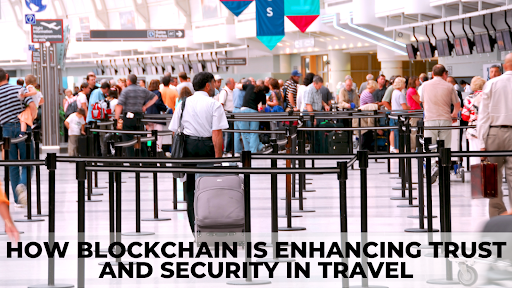How Blockchain is Enhancing Trust and Security in Travel
The travel industry faces many challenges when it comes to trust and security. Travelers often worry about data breaches and fraud, concerned for the safety of their personal information and financial transactions. Blockchain technology offers promising solutions to these concerns, revolutionizing how we book trips, manage identities, and secure payments.
This blog explores how blockchain is driving innovation and ensuring a higher level of trust and security in the travel industry.
Revolutionizing Identity Management
One of the most significant ways blockchain enhances trust in travel is through improved identity management. Traditional systems store traveler data in centralized databases, making them vulnerable to hacks and unauthorized access. Blockchain’s decentralized nature changes this paradigm entirely.
With blockchain, travelers can have a single, secure digital identity that they control. This identity can include all necessary travel documents, from passports to visas, stored securely on the blockchain. Airlines, hotels, and border control agencies can then verify this information without needing to access or store the data themselves.
Japan, a country at the forefront of technological innovation, has been quick to explore blockchain applications in various sectors, including travel. The nation’s commitment to efficiency and security aligns perfectly with blockchain’s potential to streamline travel processes. As Japan prepares for increased tourism in the coming years, it’s investing in cutting-edge solutions to enhance the visitor experience.
When visiting Japan, travelers can benefit from innovative solutions like eSIM technology. esim japan offers seamless connectivity without the need for physical SIM cards, aligning perfectly with the digital transformation happening in travel identity management.
Benefits of Blockchain-Based Identity Management:
- Reduced fraud: It’s nearly impossible to create fake identities on a blockchain system.
- Enhanced privacy: Travelers control who can access their data and for how long.
- Streamlined processes: No more carrying multiple documents or repeating the same information at every checkpoint.
Securing Payments and Reducing Fraud
Blockchain technology is also transforming how financial transactions occur in the travel industry. Cryptocurrencies and smart contracts offer new ways to handle payments securely and efficiently.
Smart Contracts: Automating Trust
Smart contracts are self-executing contracts with the terms directly written into code. They automatically enforce the agreement between buyer and seller. In travel, this can revolutionize how we book and pay for services.
For example, a smart contract could automatically release payment to a hotel only after the guest checks in, reducing the risk of fraud for both parties. If a flight is delayed, a smart contract could automatically issue compensation to affected passengers without them needing to file claims.
Cryptocurrency: Borderless Transactions
With cryptocurrencies, a blockchain can facilitate global transactions that do not need currency exchange. Fees may greatly decrease and the payment method for travelers’ journeys can become easier.
Enhancing Supply Chain Transparency
Creating an unchangeable record of transactions using blockchain is key to increasing visibility in the supply chains of travel services. Its consequences influence baggage tracking and food health in hospitality and dining areas.
Baggage Tracking
For travelers, lost luggage is a common and frustrating issue. Blockchain technology has the potential to revolutionize baggage tracking by creating a system that tracks luggage in real-time. This reduces the risk of theft, also simplifies the process of recovering misplaced items, giving travelers greater peace of mind and improving overall travel experiences.
Food Safety
Blockchain can help hotels and restaurants identify the path and background of food items. Food safety is assured and travelers can pick food choices effectively.
Loyalty Programs: Reimagined
Travel loyalty programs are revitalized by blockchain technology. Established programs often face disappointing redemption rates because of complex requirements and limited selection. Travelers find greater convenience and premium benefits with loyalty programs built on blockchain.
Benefits of Blockchain-Based Loyalty Programs:
- Instant rewards: Points get given and redeemed instantly.
- Increased liquidity: Loyalty points can switch or move freely between different programs.
- Enhanced transparency: Members can easily track their points and understand their value.
Comparison: Traditional vs. Blockchain-Enhanced Travel Systems
| Aspect | Traditional System | Blockchain-Enhanced System |
| Identity Management | Centralized, vulnerable to hacks | Decentralized, user-controlled |
| Payment Processing | High fees, currency exchange issues | Lower fees, borderless transactions |
| Loyalty Programs | Complex rules, low redemption rates | Flexible, instant rewards |
| Baggage Tracking | Limited visibility, prone to errors | Real-time, transparent tracking |
| Supply Chain | Opaque, difficult to verify | Transparent, easily auditable |
Overcoming Challenges in Implementation
While the potential of blockchain in travel is enormous, the industry faces several challenges in widespread adoption:
- Regulatory hurdles: Multiple nations are missing specific regulations concerning blockchain and cryptocurrency practices in travel.
- Technical complexity: For a blockchain implementation to occur requires considerable technical skills and support.
- Industry fragmentation: Many players in the travel market complicate the establishment of cohesive systems.
Even with these obstacles in place, numerous travel firms are funding blockchain tech because they see its ability to change the sector.
The Future of Travel with Blockchain
As blockchain further develops, we can expect a rise in diverse and innovative uses in travel. Infinite options exist in decentralized travel services and AI solutions employing blockchain for safe data management.
Through its capabilities, blockchain can enhance the reliability and satisfaction of traveling for everyone. With travelers’ growing tech knowledge and desire for better management of their data and experiences, blockchain solutions are probably destined to become the norm.
Conclusion
In the travel field beyond mere hype; blockchain technology acts as an essential element that boosts trust and security in many different applications. By protecting our identities and simplifying transactions the technology addresses key problems in travel.
To advance effectively in the travel and technology sectors must unite with regulators in facing the implementation challenges. Travelers and the entire industry will receive great advantages that cannot be overlooked.
FAQs
In what ways does blockchain safeguard my private information while traveling?
Through blockchain technology, you can regulate your digital identity by revealing only relevant facts to authorized entities. All your data is encrypted and distributed across the network, making unauthorized access more difficult.
Will using cryptocurrency become necessary for booking travel with systems based on blockchain?
Not necessarily. While a few blockchain platforms rely on cryptocurrencies as forms of exchange many have been built to support conventional currency transactions. The main advantage is improved security and clarity in transactions no matter what currency is involved.
How can I start using blockchain-enhanced travel services?
Look for travel providers that are implementing blockchain solutions. This might include airlines using blockchain for loyalty programs or identity verification, or booking platforms that offer cryptocurrency payment options. As adoption grows, these services will become more widely available.



